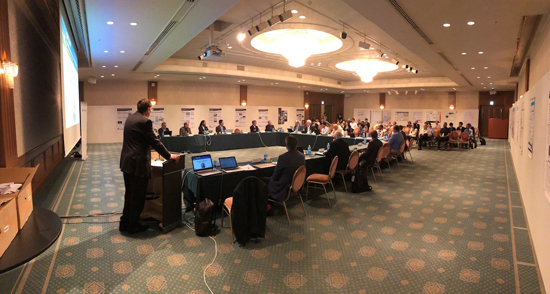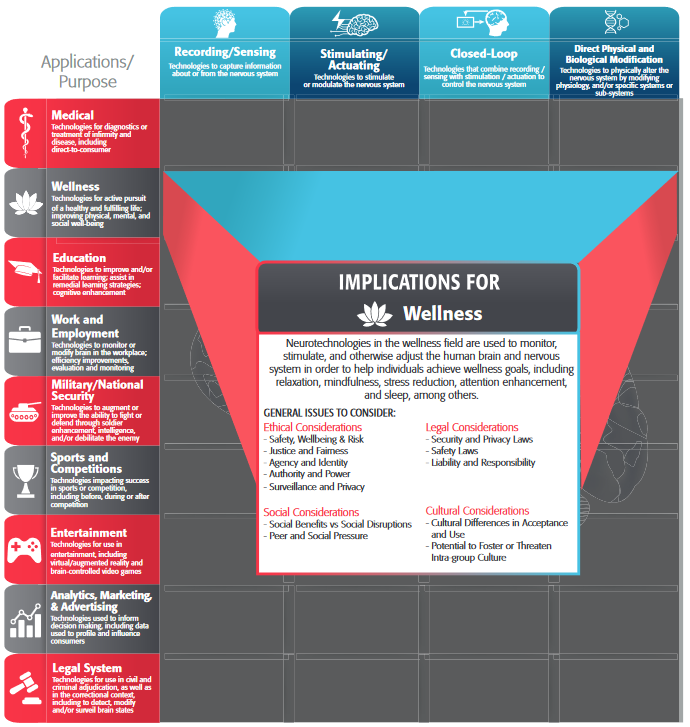EVENT
Michael H. Smith, IEEE Senior Member
On October 9, 2018, the SMC Brain-Machine Interface Systems (BMI) Workshop also featured a first-of-its-kind meeting of Global Current and Emerging Brain Initiatives. This meeting was hosted by the IEEE President, James Jefferies, and Chaired by Michael H. Smith. The meeting brought together global Brain Initiative leaders and representatives from other groups working on large-scale multi-year brain projects from Australia, Canada, China, Europe, Japan, Korea, New Zealand, Poland, Russia, and the US as well as representatives from the IEEE Brain Initiative, the International Neuroethics Society, industry, and other stakeholders. Topics discussed included the status of global brain projects and various important issues raised by the global Brain Initiatives representatives and other stakeholders. The IEEE Brain Initiative was presented and future collaborations and cooperation among IEEE, Brain Initiatives, industry, and funding agencies were discussed.
Present in this meeting were 22 participants: Michael H. Smith (Chair); James A. Jefferies, IEEE President and CEO; Nick B. Langhals, NIH/NINDS, USA; Uri Hasson, NSF, USA; Mitsuo Kawato, ATR, Japan; Andrzej Cichocki, Skoltech, Russia; Bo Xu, China Brain Project, CAS; Jan Bjaalie, EU Human Brain Project; Wlodzislaw Duch, Polish Brain Initiative; Jeong-woo Sohn, Korea Brain Initiative; Sharath Sriram, Australian Brain Alliance; Yingxu Wang, Hotchkiss Brain Institute, Canada; Tiago H. Falk, INRS-EMT, Canada; Cliff Abraham and Peter Thorn, Brain Research New Zealand; Henry T. (Hank) Greely, International Neuroethics Society; Randy Schekman (remotely), Aligning Science Across Parkinson’s Initiative; Dimitar Filev, Ford Motor Company; Ljiljana Trajkovic, Director-Elect, IEEE; Edward Tunstel, IEEE SMC Society; Paul Sajda, IEEE Brain Initiative; Konstantinos Karachalios, IEEE Standards Association; and Ricardo Chavarriaga, Chair, IEEE Group on Standards for Neurotechnology.

Figure 1. Meeting chair Michael Smith addresses the representatives of the Global Brain Initiatives.
This was the IEEE’s first collaborative meeting with global Brain Initiative leaders. One of the topics discussed was to better align and integrate IEEE with other existing brain efforts. It was pointed out to the participants that IEEE is a global technical community of over 420,000 professionals across multiple technology domains, many already active in global brain projects. Genuine interest was expressed among the representatives at the meeting in working together with IEEE, especially in the areas of standards, neuroethics, and sharing of brain data. Other topics discussed included translational neuroscience and neural engineering; how to attract engineers, scientists, programmers, mathematicians, quantitative analysts, and others to the multi-disciplinary field of neuroscience; future collaborations, cooperation, and joint proposals among Brain Initiatives, industry, and other stakeholders; creating an open process for joint partnerships between funding agencies with other countries; crating a process where researchers from various countries could work together and secure funding for specific projects, and finally, future topics that brain researchers should undertake.
Summary of comments and suggestions made by the meeting participants:
- Hank Greely (president of the International Neuroethics Society) recommended the adoption of eight “guiding principles of neuroethics” [1]: Make assessing safety paramount; Anticipate special issues related to capacity, autonomy, and agency; Protect the privacy and confidentiality of neural data; Attend to possible malign uses of neuroscience tools and neurotechnologies; Move neuroscience tools and neurotechnologies into medical or nonmedical uses with caution; Identify and address specific concerns of the public about the brain; Encourage public education and dialogue; Behave justly and share the benefits of neuroscience research and resulting technologies. While there was a general consensus on these recommendations, it was also mentioned that each country’s cultural background should be taken into consideration when interpreting these “guiding principles”. For example, some cultures focus more on family and community interests; others focus more on individuals.
- Participants agreed on the benefit of brain data sharing, giving people additional access to worthwhile and significant data. Since proper standardization of brain data is rather difficult, some suggested forming partnerships between Brain Initiative programs and other brain projects and organizations that have expertise in the standardization of brain data, such as IEEE. It was felt that these partnerships would be critical in expediting progress in brain research. Issues around data normalization to compensate for factors such as different sites, equipment, individual variations, disease and other elements were also raised and highlighted as an area that still needs active research.
- Artificial Intelligence (AI) and brain-inspired computing that bring together AI experts and neuro-scientists was another topic of great interest.
- Many felt there is a lack of multidisciplinary students and junior researchers. The need to attract engineers, scientists, programmers, mathematicians, and quantitative analysts to neuroscience was also expressed. It was recognized that there is a need to support and improve science, technology, engineering, and mathematics (STEM) education.
- Funding was another topic discussed. It was felt that brain research is not receiving sufficient funding in many countries. Creating joint multinational funding sources that would support international collaborative efforts on specific projects was suggested.
All participants felt that the meeting was very worthwhile. It was very valuable to exchange the different approaches and perspectives between the non-IEEE brain research community and IEEE. The meeting highlighted that besides the active engagement of IEEE members in the different brain-initiatives, IEEE expertise in related activities such as standardization, education and data management can be a valuable contribution to improve the state of the art of neurotechnologies. All felt that such meetings between IEEE and the brain research community should be held in the near future.
A white paper by the participants of this meeting is currently in preparation. The paper will address and discuss in greater details the issues and recommendations emanating from the meeting. It will also include specific recommendations that the meeting participants believe should be adopted by the global Brain Initiatives and brain projects.
I thank Ljiljana Trajkovic, Hank Greely, Tiago H. Falk, and Ricardo Chavarriaga for their valuable help in preparing this article.
References
- Greely, H. T., Grady, C., Ramos, K. M., Chiong, W., Eberwine, J., Farahany, N. A., … Serrano, E. E. (2018). Neuroethics Guiding Principles for the NIH BRAIN Initiative. The Journal of Neuroscience, 38(50), 10586 LP-10588. https://doi.org/10.1523/JNEUROSCI.2077-18.2018
About the Author
 Michael Smith, PhD, was the Chair of the 2018 IEEE SMC Meeting of Global Current and Emerging Brain Initiatives. He has also served as the Chair or Co-Chair of eight IEEE SMC BMI Workshops, including this year’s workshop. He currently is the Chairman of the Board of Furaxa, Inc, a biotech company, and a Visiting Scholar at the University of California, Berkeley. He also serves on the Advisory Board of UC Berkeley’s Center for Neural Engineering & Prostheses, is a Senior Advisor of the IEEE Brain Initiative, and is also the Chair of IEEE SMC’s Technical Committee on Brain-Machine Interface Systems. He previously served as President of the Intelligent Robotics Corporation, President of the IEEE Systems, Man and Cybernetics (SMC) Society, and President of the North American Fuzzy Information Processing Society. His research interests include the development of low-cost, real-world Brain-Computer Interface Systems, AI, and robotics. Dr. Smith received four degrees from UC Berkeley, including a M.S., MBA, and PhD.
Michael Smith, PhD, was the Chair of the 2018 IEEE SMC Meeting of Global Current and Emerging Brain Initiatives. He has also served as the Chair or Co-Chair of eight IEEE SMC BMI Workshops, including this year’s workshop. He currently is the Chairman of the Board of Furaxa, Inc, a biotech company, and a Visiting Scholar at the University of California, Berkeley. He also serves on the Advisory Board of UC Berkeley’s Center for Neural Engineering & Prostheses, is a Senior Advisor of the IEEE Brain Initiative, and is also the Chair of IEEE SMC’s Technical Committee on Brain-Machine Interface Systems. He previously served as President of the Intelligent Robotics Corporation, President of the IEEE Systems, Man and Cybernetics (SMC) Society, and President of the North American Fuzzy Information Processing Society. His research interests include the development of low-cost, real-world Brain-Computer Interface Systems, AI, and robotics. Dr. Smith received four degrees from UC Berkeley, including a M.S., MBA, and PhD.


